- Home
- John Harris
Swordpoint (2011)
Swordpoint (2011) Read online
Table of Contents
Copyright & Information
About the Author
Quote
Author's Note
Map LH
Map RH
Map Full
Oranisation Tree
Part One
One
Two
Three
Four
Five
Six
Seven
Eight
Nine
Part Two
One
Two
Three
Four
Five
Six
Part Three
One
Two
Three
Four
Five
Six
Seven
Eight
Nine
Synopses of John Harris Titles
Copyright & Information
Swordpoint
First published in 1980
Copyright: Juliet Harris; House of Stratus 1980-2011
All rights reserved. No part of this publication may be reproduced, stored in a retrieval system, or transmitted, in any form, or by any means (electronic, mechanical, photocopying, recording, or otherwise), without the prior permission of the publisher. Any person who does any unauthorised act in relation to this publication may be liable to criminal prosecution and civil claims for damages.
The right of John Harris to be identified as the author of this work has been asserted.
This edition published in 2011 by House of Stratus, an imprint of
Stratus Books Ltd., Lisandra House, Fore Street, Looe,
Cornwall, PL13 1AD, UK.
Typeset by House of Stratus.
A catalogue record for this book is available from the British Library and the Library of Congress.
EAN ISBN Edition
0755102428 9780755102426 Print
0755127617 9780755127610 Mobi/Kindle
0755127897 9780755127894 Epub
This is a fictional work and all characters are drawn from the author's imagination.
Any resemblance or similarities to persons either living or dead are entirely coincidental.
www.houseofstratus.com
About the Author
John Harris, wrote under his own name and also the pen names of Mark Hebden and Max Hennessy.
He was born in 1916 and educated at Rotherham Grammar School before becoming a journalist on the staff of the local paper. A short period freelancing preceded World War II, during which he served as a corporal attached to the South African Air Force. Moving to the Sheffield Telegraph after the war, he also became known as an accomplished writer and cartoonist. Other 'part time' careers followed.
He started writing novels in 1951 and in 1953 had considerable success when his best-selling The Sea Shall Not Have Them was filmed. He went on to write many more war and modern adventure novels under his own name, and also some authoritative non-fiction, such as Dunkirk. Using the name Max Hennessy, he wrote some very accomplished historical fiction and as Mark Hebden, the 'Chief Inspector' Pel novels which feature a quirky Burgundian policeman.
Harris was a sailor, an airman, a journalist, a travel courier, a cartoonist and a history teacher, who also managed to squeeze in over eighty books. A master of war and crime fiction, his enduring novels are versatile and entertaining.
Quote
‘If I had anything like your ability and industry, I think I should concentrate almost entirely on the actualities of war – the effects of tiredness, hunger, fear, lack of sleep, weather, inaccurate information, the time factor and so forth. The principles of strategy and tactics and the logistics of war are really absurdly simple; it is the actualities that make war so complicated…’
A P Wavell to Liddell Hart
Author’s Note
It is virtually impossible for the staff who plan a battle and the men who fight it to see it the same way. Indeed, for the men who are doing the shooting and are being shot at, it is usually difficult to understand what is going on except in their own small corner of the affair.
This is the story of a battle seen at one level through the eyes of a battalion and at another through the eyes of the planners. It is not my intention to denigrate the staff. Though the regimental soldier often denounced the staff in no uncertain terms, it was largely ritual, and the intense dislike that existed for the staff in World War I never existed in World War II. Nevertheless, war isn’t just numbers. Personalities come into it, and my wish is merely to show how personality can become another of the actualities of war.
All units and characters are fictitious and I have tinkered a little with geography; but, apart from the ending, the battle did take place very much as described, though earlier and with troops which were not British.
I am very much indebted to Fred Majdalany’s two books, Cassino and The Monastery, without which it would be almost impossible to write a clear account of what occurred on and around the Rapido, the Liri and the Garigliano rivers in the early part of 1944. I am also indebted for company, battalion and higher command details to Charlie Company by Peter Cochrane, and to Major-General F H Brooke, CB, CBE, DSO.
Map LH
Map RH
Map Full
Oranisation Tree
Part One
The Sword
‘It is the common soldier’s blood
that makes the general a great man.’
Eighteenth-century saying
One
The track swung past a tangle of dead mules, wrecked containers and torn panniers, where a heavy stonk from the German batteries had caught a supply column as it had rounded the corner and spread them all over the hillside. Winding away from the craters and the seared stones, it then crossed a wooden footbridge and dropped into a gully scattered with the relics of old battles – steel helmets, ammunition pouches, bits of rifles, bits of machine-guns, bits of boots, bits of clothing – even bits of human beings, because sometimes the helmets held part of a head or the boots part of a foot.
Warmed by a couple of strong whiskies at battalion headquarters, Mark Warley zigzagged through the battered olive groves until they grew sparse and finally disappeared. Then the track began to climb, wet and slippery to his feet because it had never stopped raining for a month. The mud coated his boots and gaiters and lay in grey slashes and smears on his uniform – as it lay in slashes and smears on everything. The downpours had reduced men, machines, roads, mountains and fields to a uniform drabness.
Directly in front of him a great wall of mountain rose about three miles away. It was a view that should have been breathtaking but only made Warley’s heart sink as he saw it. It was the strongest part of the German defensive position running across Italy that was known as the Gustav Line, and the highest peak, Monte Cairo, was over 5000 feet high and bleak enough to be quite uninhabitable. Lower down was another peak, and 1500 feet below that the River Rapido, a puny enough stream in normal times but a formidable obstacle to an army with the bulk of the mountain behind. There was something titanic about the scene, frightening in its vastness, sombre under the low cloud and drizzling rain that blurred outlines and gave the slopes a menacing appearance of evil.
In the grey light the peaks looked like cut-outs for a stage presentation. On the one to the west of Monte Cairo, just ahead of the others, was the uneven crumbled shape of a building. The Abbey of Monte Cassino had been founded by Saint Benedict in the sixth century and it overlooked the town of the same name in the valley below where it was known Mark Antony once had a villa. The abbey had been wrecked by the Lombards in the sixth century; by the Saracens in the ninth; by an earthquake in the fourteenth; and finally at the end of that winter of 1943/4,
by the Allied troops trying to drive Kesselring’s German divisions up the length of Italy. And this time there was little of it left, because in February heavy and medium bombers had dropped hundreds of tons of explosive on it.
Even if there were no Germans in the monastery – and German propaganda insisted there weren’t – it had been decided that it had been built as a fortress and, in effect, still was a fortress, with walls 150 feet high and ten feet thick at the base, pierced with slits for the defenders to shoot through. Despite its religious significance, nobody had had the slightest doubt that, in the extremity of defeat, the Germans would occupy it and the only way to prevent that had been to destroy it, and with it, unhappily, the works of art it contained.
Although he was a sensitive man and regretted the artistic loss, Warley felt no regrets whatsoever at the bombing. The monastery had overshadowed his life for too long, and the people in the top echelons of power were growing impatient. The whole Italian campaign – indeed, the whole war and the invasion of Europe – was being held up by it, because it was believed now that the Germans were using the ruins as an observation post for their guns. They dominated the whole plain to the south below them, and there wasn’t a single man in the armies around who hadn’t realised that they were the key to Rome. When the monastery fell, Rome would fall. Everybody knew it. It was there all the time, overlooking everything they did, everything that went on in the flooded plain and along the Rapido, the Garigliano and the Liri.
To Warley, in the failing light it seemed that ten thousand eyes watched every footstep he took. Far behind him, he could see the flashes of guns, and hear the thump of the German artillery replying and the rush of the shells tearing over his head. He felt curiously detached from the war. A single-minded man, a journalist in York in civilian life and not a particularly important one, he had the ability to forget his past life and the possibilities of the future in order to concentrate solely on the present. It made things very simple. He was a stocky man, young for his rank of major, dark-visaged but typical of the county he came from; strong, tireless, by no means a man of brilliance with the speed to win races, but dogged, stolid; cheerful for most of the time; quick to anger and just as quick to simmer down. To Warley the war was a nuisance; he had plans for the future and the war was simply something that got in the way. His character enabled him to accept it, however, not complaining, waiting patiently until it ended. And he knew it would end before too long, because the Germans had been in retreat everywhere since the last months of ’Forty-two.
As he worked his way across a last shell-torn stretch of flat land, the smell of death became increasingly powerful. The cause was a mule, in an advanced state of decomposition. ‘Bear right when the mule begins to smell really strong’ was the instruction they gave visitors. It was the same smell he’d smelled a hundred times before, whether the dead were four-legged or two-legged, whether British, American, Indian, German or Italian.
Company headquarters were in a wrecked farmhouse that looked as though it had simply been dropped down and forgotten. Meagre grass and infrequent patches of scrub were the only vegetation, because all the trees had long since been blasted by the artillery. It was a desolate area patterned only by the formation of rock and the paths worn by men’s boots to where Warley’s understrength rifle company was fanned out in a rough semi-circle.
Captain Jago, his second-in-command, was waiting for him, big, rangy and red-haired, the harsh angles of his face caught by the light from a pressure lamp. There was a mug of tea on the box that did duty for a table, and Jago sloshed a measure of rum into it and held it out.
Warley grinned as he took it. ‘You’d never believe it, Tony,’ he said. ‘The Gurkhas are taking over. We’re being relieved.’
They moved out that same night. The artillery was stirring things up among the German positions so that the sound of boots and lorry engines wouldn’t be heard. Since the firing wasn’t particularly violent, most of the men moving back considered that all it would do was make the Herrenvolk suspicious.
Nevertheless, they were glad to go. For the past week they’d been living on food cooked a mile behind the lines and brought up in hot boxes by mules or on the shoulders of Indian porters. They’d shaved and cleaned their teeth in the dregs of their tea and performed their bodily functions into bully-beef tins. They’d lived in stone-built shelters because the ground was too rocky to dig trenches, aware that medical evacuation, if they were hit, constituted an enormous problem. On a wet night you could count yourself lucky to be in a dressing station within a matter of hours and without being dropped by the stretcher bearers.
The army’s advance up the spine of Italy had been that of a bull, wearied yet still willing, butting its way head-down into assault after assault. The pattern had rarely changed.
Plains were few and far between and no sooner had one river or mountain barrier been crossed than another had barred the route. They’d battled across the Creti, but behind the Creti was the Agri, and behind the Agri was the Sele, and behind the Sele was the Volturno. As someone had said, there was always ‘one more river to cross’. To say nothing of the little towns they’d had to fight for, street by street, house by house, even floor by floor. On one spur of land, so many shells had been dropped the Americans had called it Million Dollar Hill. The whole country, every river, every town, every hill, had shown them how useless machines could be when climate and terrain conspired to make them so.
‘Oh, yes,’ the current joke ran, ‘the Germans are retreating all right. Unfortunately, they’re taking the last ridge with ’em.’
They weren’t even sure why they were there. Some said it was to distract the Germans while they got the Second Front going in France; others that they were trying to get to Vienna before the Russians.
‘Strategically,’ Jago had observed more than once, ‘Italy might be the soft under-belly of Europe, but physically it’s more like a bloody hard backbone.’
Again and again the Germans had held a position until it had become dangerous, then pulled back a mile or so to the next, leaving behind them a trail of minefields, blown bridges and demolished roads. Again and again they had forded streams or assaulted heights in the darkness, to dig themselves in before dawn, leaving the Sappers to remove the debris and repair the damage behind them for the tanks to pass through. But always the Germans, already pulling out to the next place, had frustrated them by raining down artillery and mortar fire on their own recently-vacated strongholds.
Added to all of which, the Italian winter – something they had never known about in the days when their knowledge of the country had consisted of picture postcards, colourful calendars and a quick gallop through ‘The Isle Of Capri’ – had hit them with all its bitter drenching fury, so that mud made transport virtually useless and the low ceiling grounded the supporting aircraft. Now, here, before Cassino, they had stopped yet again, to lick their wounds, to reorganise and rest, just holding the line. That, in all conscience, had seemed quite enough but in the end it hadn’t proved to be, and two major assaults on the German position had already been thrown back with heavy losses.
They had been fighting almost continuously for six months. Wet and frozen, they had known nothing but mud and mountains for weeks, sometimes never seeing the sky or even the next slope for days when the mist and low cloud clung round the hills. And what did they get for their trouble? Complaints from home that they weren’t moving fast enough and – as if it weren’t enough to know that back home the men training for the Second Front at least had beer and girls to go for – the nickname D-Day Dodgers’.
‘Which D-Day do they mean?’ Jago had said. ‘It’s all bloody D-Days out here.’
The Gurkhas appeared as soon as it was dark; small, smiling brown men whose teeth shone in the shadows.
‘Tik hai, Johnny,’ they called, because the Gurkhas were trusted troops and everybody got on well with them.
‘Tik hai,’ the little men called back, moving into the positions th
ey vacated.
They accomplished the changeover without casualties, racing against the coming daylight. Eventually they bumped into other battalions which were also being relieved, the returning mule columns jostling against each other in the congestion, all of them with only one idea in their minds – to reach safety.
They passed a ditch crammed with dead animals and smashed vehicles, then branched away from the road and took a mule track. The early morning mist was rising out of the valley, and away to the north it lay heavy by the river where it was thickened by smoke shells. They could just see the outline of Monastery Hill now, and it seemed so high and yet so close they felt the Germans could reach down and touch them on the shoulder.
The men’s boots barely left the ground, their bodies rocking from side to side like clockwork dolls, as if that were the only way they could move their feet forward; using their last ounce of energy to shift their legs. Yet, somehow, there was an enduring stolidity about them, as if they could march for ever.
Their faces, blurred by a fuzz of beard, were filthy and the eyes that stared from them appeared to gaze into space, seeing nothing. There was no singing or whistling and nobody spoke. Half of them had forgotten where they were going. They didn’t care much, anyway, so long as they could sleep, get a hot bath and put on clean clothes before going into a town. It didn’t matter which town, so long as there were pavements to walk on instead of mud; shops, even empty Italian shops; and cafés – even cafés that sold Italian vermouth and wine instead of good English beer. And women, of course. Above all, women; women they could joke with, torment, even just look at.

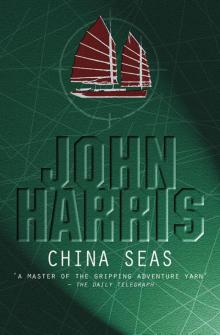 China Seas
China Seas The Mercenaries
The Mercenaries Road To The Coast
Road To The Coast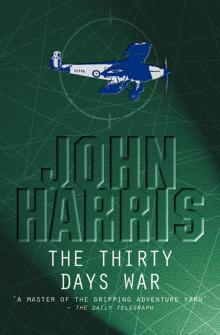 The Thirty Days War
The Thirty Days War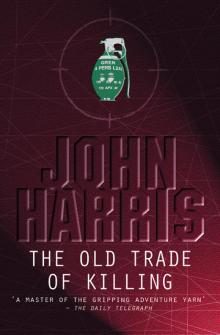 The Old Trade of Killing
The Old Trade of Killing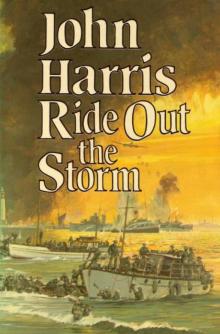 Ride Out The Storm
Ride Out The Storm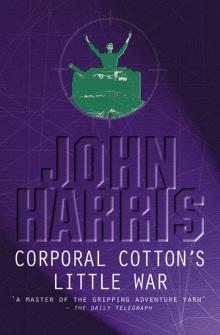 Corporal Cotton's Little War
Corporal Cotton's Little War Fox from His Lair
Fox from His Lair Paint The Rainbow
Paint The Rainbow Flawed Banner
Flawed Banner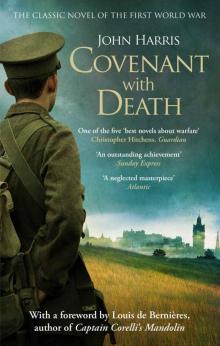 Covenant with Death
Covenant with Death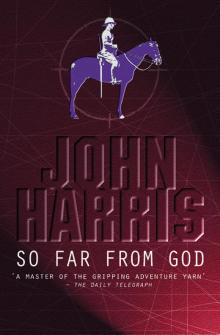 So Far From God
So Far From God The Sea Shall Not Have Them
The Sea Shall Not Have Them The Cross of Lazzaro
The Cross of Lazzaro Smiling Willie and the Tiger
Smiling Willie and the Tiger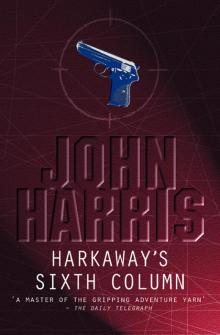 Harkaway's Sixth Column
Harkaway's Sixth Column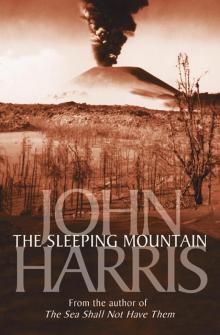 The Sleeping Mountain
The Sleeping Mountain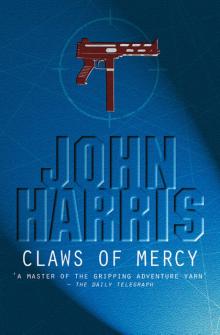 The Claws of Mercy
The Claws of Mercy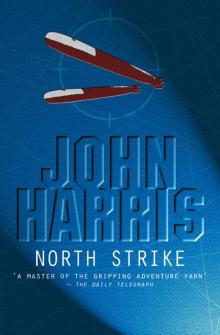 North Strike
North Strike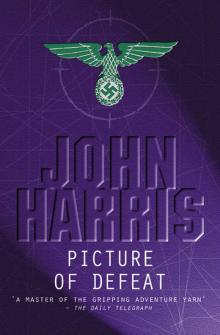 Picture of Defeat
Picture of Defeat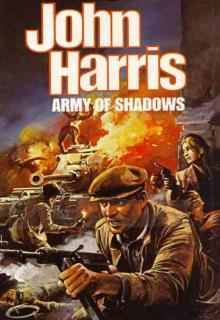 Army of Shadows
Army of Shadows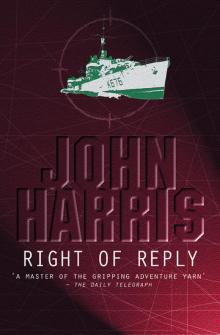 Right of Reply
Right of Reply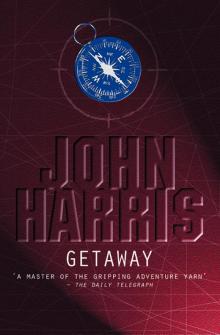 Getaway
Getaway The Lonely Voyage
The Lonely Voyage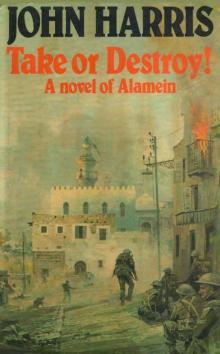 Take or Destroy!
Take or Destroy!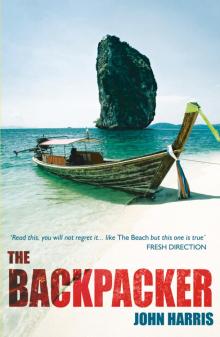 The Backpacker
The Backpacker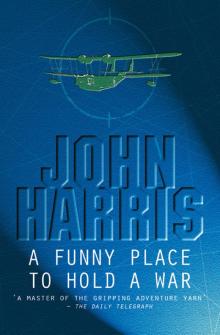 A Funny Place to Hold a War
A Funny Place to Hold a War Swordpoint (2011)
Swordpoint (2011)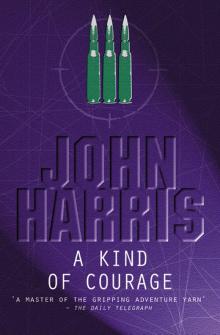 A Kind of Courage
A Kind of Courage